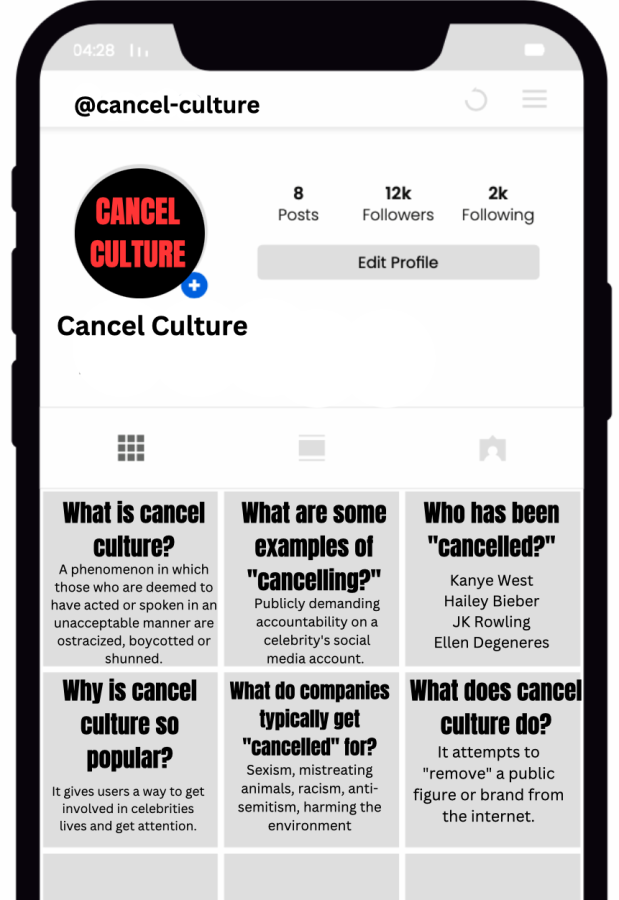The cancel culture phenomenon continues to spread
March 31, 2023
Cancel culture has become an extremely prominent form of recognizing the misbehavior of celebrities.
According to Wikipedia, “cancel culture is a phenomenon in which those who are deemed to have acted or spoken in an unacceptable manner are ostracized, boycotted or shunned.” The notion that someone can be “canceled,” or, prevented culturally from having a prominent public platform or job, has generated intense controversy over the past few years.
The emergence of “cancel culture” and the concept of canceling someone follows a well-known pattern: A public figure, such as a star, says or does something offensive. Following the surfacing of any offensive or controversial remark, supporters and individuals publicly demand accountability. They take to various social media platforms such as TikTok, Instagram, and Snapchat to essentially attack the star. Although canceling has always existed, it has lately gained significant popularity as a result of the rise of social media and online news.
Canceling has taken an unusual turn with TikTok celebrities. There are two extremes in the TikTok cancel culture: either there are no repercussions for offensive behavior, or there is such an outburst of hate that the individual gets written attacks and even death threats.
For example, The D’Amelio family launched their own YouTube channel in October 2020, where they documented their lives. This was before they had their show on Hulu, The D’Amelio Show, and they had no idea that a short video would spark a heated debate.
The D’Amelio family shared a film of one of their meals with an anonymous guest and YouTuber, James Charles, on November 16, 2020 on their channel. They were treated to a fancy dinner prepared by a special chef for the event. Marc, Heidi, and James seemed to enjoy the food, but Dixie and Charli didn’t appear to be as enthusiastic. Dixie sampled what looked like a snail and gagged at the table and then stared at the food with disgust. The cook went on to describe the dish’s background, but the D’Amelio sisters didn’t act particularly intrigued. After Dixie had vomited the food outside, Charli asked, “Do we have any dino nuggets?”
Fans began “canceling” Charli and Dixie on TikTok immediately after the video was uploaded, saying they were ungrateful for the delicious food the chef prepared for them. Their comment sections were flooded with hateful and offensive comments. One Twitter user said: “The D’Amelio’s (ESPECIALLY) the girls are soo toxic and annoying. Talking about how bad the food is (when the chef’s there) while there are people who can’t even get any food, or that you’re asking for more followers, just shows how spoiled you are and asking for attention.”
Few admirers, however, defended the sisters and claimed it was unfair to “cancel” them for such a ridiculous cause. Dixie D’Amelio went to TikTok after the dinner party video to discuss what actually occurred, but the video had already gone viral and taken out of context.
The “cancel culture” of TikTok also has the potential to ruin companies. A widely discussed example of how cancel culture can harm a brand’s image is with well-known skinfluencer Hyram Yarbro. In a YouTube video with more than 1.2 million views, he “demolished” St. Ives, a popular skin care brand. He criticized the company’s goods for having too much scent, not enough “good ingredients,” and harsh chemicals. While St. Ives has taken most of the heat from the TikTok skincare critics, other cosmetics manufacturers have also been impacted.
Anyone who has spent any time on Twitter has also most likely noticed the hashtag #IsOverParty spreading in some way. IsOverParty is most frequently used after the name of something or someone that has been “canceled.”
The hashtag #TaylorSwiftIsOverParty started trending in July 2016 in response to the news that said Swift was aware Kanye West had made a reference to her in one of his songs, “Famous.” He implied in the song that he is credited for making her famous by interrupting her during her acceptance speech at the 2009 Video Music Awards. In this situation, tweeters criticized Swift for implying a conflict between her and West, assuming that she knew of the song prior to its release, and that there weren’t any resentments between them.
Over the years, cancel culture has changed and is now a significant aspect of everyday news. Everytime you look on social media, a different celebrity is being destroyed. This is due to the evolution of social media, as well as the fact that news is readily accessible online and has the ability to spread very rapidly.
